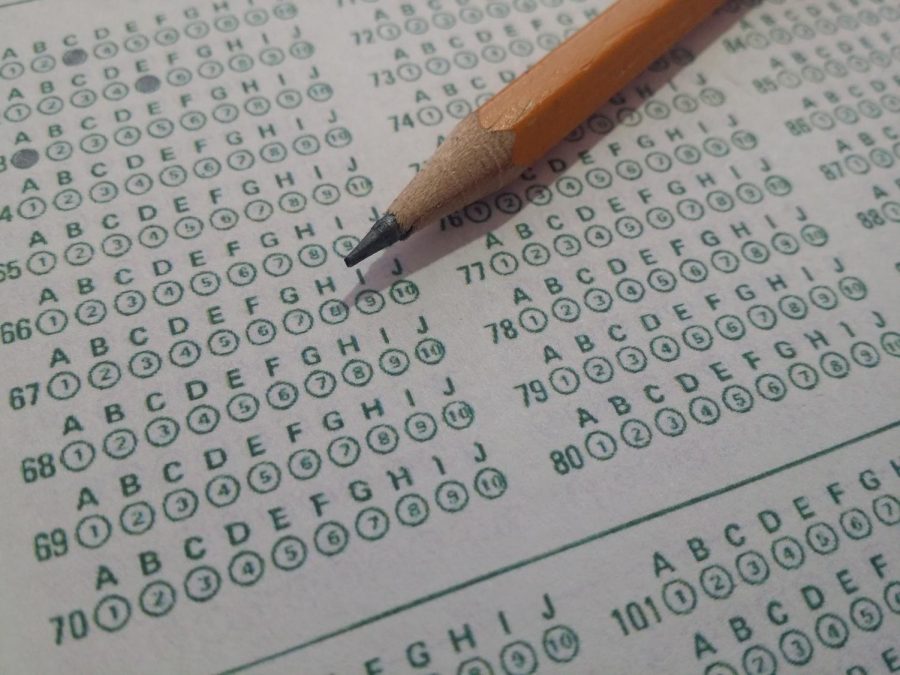Is it worth it? The ongoing debate over standardized testing
The education system has come under much criticism over the past couple of years for its methods when it comes to teaching children. One of its most controversial aspects is its emphasis on standardized testing. Some have argued that this emphasis on testing doesn’t work for all children, and that it doesn’t accurately represent their intelligence. The Colt sat down with members of the faculty to get their viewpoints on standardized testing.
The Colt: What do you think of the current Every Student Succeeds Act?
Dr. Shahveer Dhalla, principal: I think every student is different. Giving them the same standards is misleading, some students aren’t good at testing.
Jeanne Drapeau, history teacher: Testing may be stressful for some students, but testing is a normal and expected way of assessing what students have learned. We test each unit, semester exams, etc. It’s when you compare state testing results from year to year its comparing apples to oranges, its two different cohorts which really can’t be compared. Then schools are rated on those scores and improvement which really is not improvement because it’s a different group of students.
Emily Miller, journalism teacher: I think it’s a worthwhile idea, but I think that it’s kind of an easy blanket idea for all kids and all kids are not the same.
TC: What do you think about standardized testing?
SD: It is necessary to make sure every school does its part.
JD: I feel that it is overemphasized. Each year is a different group of students, so when you compare one year to the next you are comparing apples to oranges. Is there really growth?
EM: Standardized testing doesn’t work for all kids, and not every kid is going to succeed in that particular type of test given in that particular way on a particular day.
TC: Do you think standardized testing benefits students or harms students?
SD: It depends on the format of the test and how they’re testing it. Are we testing for memorization or some other aspects? I think individual students are not harmed.
JD: In many ways, it puts undue stress on students. With the number of tests they need to take, when you compare the U.S. to other countries in Europe and Asia, we test much less. On the other end of the spectrum, it does force students to retain knowledge as they go from grade to grade.
EM: I think it’s probably more harmful than beneficial. It’s tailored to a very specific type of student. Students tend to be very stressed about tests and if they don’t do well, they tend to take it personally as opposed to thinking about all these different things that play into it.
TC: What do you think would happen if we got rid of standardized testing?
SD: We couldn’t get rid of it, as it takes away accountability from schools to teach certain things.
JD: A ton of money would be saved and possibly put back into the education system. Years ago, geography had a standardized test and it forced the teachers to become better teachers. I don’t think teaching and classes would change too much because we need to increase rigor to help prepare students for college. There may be a little more leeway for creativity in lessons and projects and more time for those kinds of assignments.
EM: I think we would still need a way to find out if students were ready to advance to the next grade, but I think there would be many other options. We could do unit tests, we could do face to face interviews, a presentation, or some other type of project that would showcase everything they’ve learned.
TC: What do you think of the education system as a whole?
SD: I wouldn’t be working in it if I didn’t believe in it, we do have some areas that we could improve in.
JD: No system is perfect but, if you have teachers that love what they do and want to nurture knowledge and curiosity for knowledge in their students then students will learn and grow.
EM: I think it needs some work. I think our students are changing, and I think that the climate is changing. I think we need to be open to growth and to change.
TC: How do you think that standardized testing will affect the younger generation going into the future?
SD: I don’t think the test affects them, some students are good at testing, while at the same time being bad at the day-to-day learning.
EM: I really don’t think it will affect them that much going into their careers. It is one of those things where you take the test the day of and then you move on and forget about it. Once you graduate high school it doesn’t really follow you.
TC: How do you think standardized testing affects teachers?
SD: It puts a lot of pressure on teachers. But at the same time, it helps them focus on what they should be teaching. Whether that is good or bad varies.
JD: I feel there is a lot of pressure on teachers to have their students be successful. This is difficult when there is an inequity between students. Some are homeless, abused, must work to help the family, not enough food, unmotivated to learn, and the list can go on and on. These are things teachers have no control over but are still pressured to have students succeed.
EM: Teachers would have more freedom in what they taught if we didn’t have standardized testing. Because right now you teach for the test, you know XY and Z will be on the test, so the teacher has to cover XY and Z before April. If we didn’t have a test like that, the teacher could cover different things or could spend more time on x, and not so much time on y and z.

